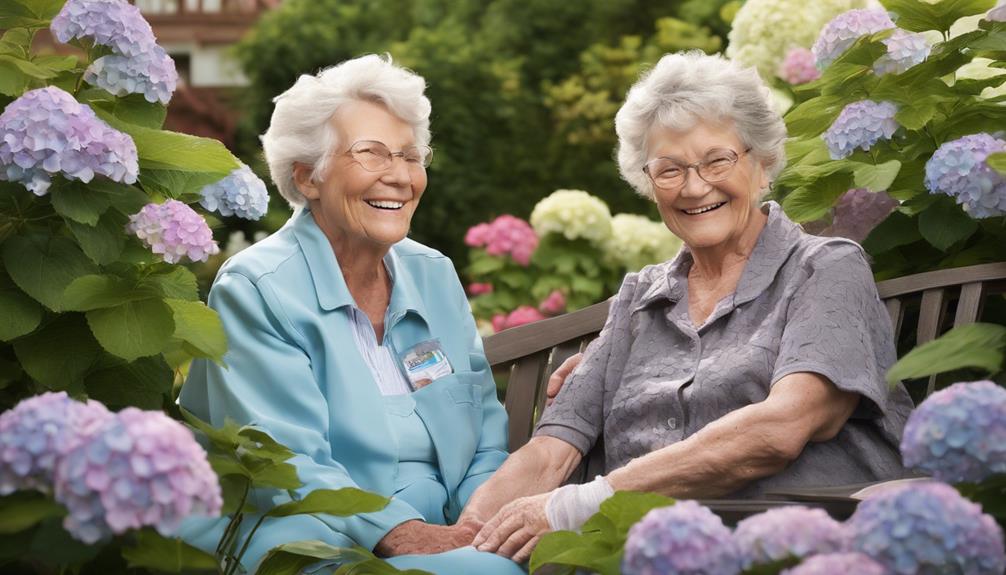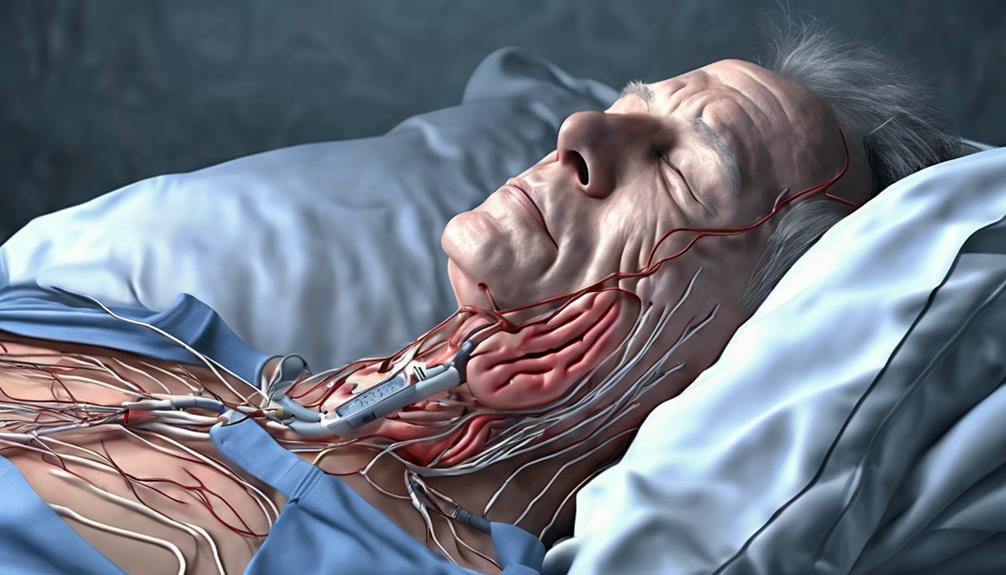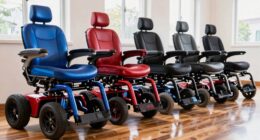Dehydration can lead to hallucinations by disrupting the body’s electrolyte balance. It is crucial to recognize this health issue and take steps to prevent it. Hallucinations triggered by dehydration commonly impact older individuals who may not be consuming enough water. Diseases like Alzheimer’s can impair the ability to feel thirsty, resulting in dehydration-related hallucinations. Consuming adequate fluids and hydrating foods can assist in combating these hallucinations. It is important to be aware of dehydration symptoms such as dry mouth, tiredness, and dark urine. Seeking advice from healthcare professionals for tailored hydration recommendations can be beneficial. Acting promptly to address dehydration is essential in order to avoid complications like hallucinations.
Key Takeaways
- Dehydration triggers hallucinations via electrolyte imbalances in the brain.
- Older adults are at higher risk due to decreased water intake.
- Underlying conditions like Alzheimer's can hinder thirst recognition.
- Recognize dehydration symptoms early to prevent hallucinations.
- Adequate fluid intake and hydrating foods combat dehydration-induced hallucinations.
Dehydration and Hallucinations Link
Dehydration can directly lead to electrolyte imbalances, potentially triggering hallucinations in individuals. This is particularly worrisome for older adults, as they're more prone to dehydration due to various factors like decreased water intake. In conditions such as Alzheimer's, cognitive impairment can make it challenging for individuals to recognize their thirst, further increasing the risk of dehydration-induced hallucinations.
When dehydration sets in, the body lacks enough fluids to carry out its normal functions, leading to imbalances that can affect the brain and its sensory processing. This imbalance can manifest as hallucinations, where individuals may experience sights, sounds, or sensations that aren't actually present. For older adults, especially those with cognitive impairments like dementia, staying hydrated is essential to prevent such occurrences.
To combat dehydration and reduce the risk of hallucinations, it's vital to ensure adequate fluid intake throughout the day. Encouraging older adults to drink water regularly and offering hydrating foods can help maintain proper hydration levels, potentially mitigating the onset of hallucinations.
Underlying Conditions and Hallucinations

As we shift focus to underlying conditions and hallucinations, it becomes apparent that certain medical factors play a significant role in exacerbating the risk of hallucinations in individuals.
When considering hallucinations related to dehydration, especially in older adults, several key factors come into play:
- Essential Imbalances: Dehydration can disrupt the equilibrium of vital minerals like sodium and potassium in the body, leading to hallucinations.
- Medications and Infections: Certain medications or infections can further deplete the body of fluids, worsening dehydration and increasing the likelihood of experiencing hallucinations.
- Cognitive Impairments: Individuals with conditions like Alzheimer's or dementia may already have compromised hydration levels, making them more susceptible to dehydration-induced hallucinations.
- Age-Related Risks: Older adults are at a higher risk of dehydration due to age-related changes in the body, making them more prone to experiencing hallucinations triggered by essential imbalances.
Understanding these underlying conditions is essential in recognizing and addressing the risk factors associated with dehydration-induced hallucinations, particularly in older individuals.
Recognizing Dehydration Symptoms
How can we easily identify the signs of dehydration in ourselves or others? Dehydration symptoms can manifest in various ways, such as a dry mouth, fatigue, dizziness, and dark urine. Additionally, cognitive effects like confusion, irritability, and difficulty concentrating may indicate dehydration. Severe dehydration poses a higher risk of hallucinations due to electrolyte imbalances affecting brain function. Recognizing dehydration signs early is important to prevent complications like hallucinations. Below is a table summarizing common dehydration symptoms to watch out for: It’s essential to stay alert to these signs, especially if you’re engaged in strenuous physical activity or are in a hot climate, as dehydration can worsen quickly under such conditions. Learning **how to recognize hallucinations** in yourself or others can be crucial in preventing severe complications, as they may indicate that dehydration has progressed to a dangerous level. If you suspect intense confusion, disorientation, or visual disturbances, immediate rehydration and medical attention are necessary.
| Dehydration Symptoms | Description |
|---|---|
| Dry mouth | Feeling parched or thirsty |
| Fatigue | Experiencing extreme tiredness |
| Dark urine | Urine appearing amber or brown |
Monitoring hydration levels and addressing dehydration promptly can help avoid hallucination-inducing electrolyte imbalances. Remember, staying hydrated is essential for overall well-being and preventing adverse effects like hallucinations.
Treating Dehydration in Older Adults

To effectively address dehydration in older adults, it's crucial to replenish fluids and electrolytes promptly. When treating dehydration in older individuals, there are several key steps that can be taken to guarantee their health and well-being:
- Encourage the older adult to drink fluids regularly throughout the day to combat dehydration caused by various factors such as medical conditions.
- Consider offering electrolyte-containing beverages to older adults experiencing significant electrolyte loss due to dehydration.
- In cases of severe dehydration, it may be necessary to administer intravenous electrolytes under the guidance of healthcare providers.
- Always consult a healthcare provider to determine the best course of action for preventing and managing dehydration in older adults, especially if they have underlying medical conditions that could complicate treatment.
Preventing Dehydration Through Hydration
Ensuring adequate hydration is essential in preventing dehydration-related cognitive symptoms such as hallucinations. To prevent dehydration, it's pivotal to maintain a proper balance of fluids in our bodies. Monitoring our water intake based on factors like body weight and activity level is key to preventing dehydration and the associated risks of hallucinations. Consuming water-rich foods and electrolyte-containing beverages can support hydration and help prevent cognitive symptoms caused by dehydration. Adjusting fluid intake according to circumstances like fever or exercise can also aid in maintaining proper hydration levels and cognitive function.
It's important to remember that staying hydrated isn't just about drinking water but also about incorporating hydrating foods and beverages into our daily routine. Consulting a healthcare provider for personalized hydration recommendations can provide valuable insights into preventing dehydration-induced hallucinations. By prioritizing hydration and being mindful of our fluid intake, we can notably reduce the risk of dehydration and the cognitive symptoms, such as hallucinations, that may accompany it.
Dietary Adjustments for Dehydration

To maintain proper hydration levels and reduce the risk of hallucinations, it's vital to make dietary adjustments. Including water-rich foods like watermelon and cucumbers, as well as hydrating beverages such as coconut water, can help.
Avoiding dehydrating drinks like alcohol and sugary beverages is important for supporting hydration and preventing hallucinations.
Hydration and Nutrition
Staying adequately hydrated involves adjusting our fluid intake based on our body weight and level of physical activity. When aiming to prevent dehydration, especially in older individuals, it's essential to not only drink water but also focus on the quality of our nutrition. To enhance hydration and overall well-being, consider the following dietary adjustments:
- Incorporate electrolyte-containing beverages to replenish lost minerals.
- Opt for high-water content foods like fruits and vegetables for added hydration.
- Adjust fluid intake according to factors such as fever or intense exercise.
- Consult a healthcare provider for personalized advice on fluid intake and dietary adjustments to maintain a good quality of life.
Fluid Intake Recommendations
Monitoring our daily fluid intake is vital for maintaining proper hydration levels and preventing dehydration-related issues. Adequate fluid intake varies depending on factors like weight, activity level, and environment. For most adults, the standard recommendation is around 8 cups (64 ounces) of water daily.
High-water content foods such as fruits, vegetables, and soups can also help with hydration. In hot weather, during physical activity, or when experiencing medical conditions like fever or diarrhea, fluid needs increase. It's essential to pay attention to urine color as well; aiming for pale yellow to clear urine indicates proper hydration.
Remember to drink fluids regularly throughout the day to stay hydrated and prevent dehydration.
Memory Care Services for Dementia

Memory care services at Peregrine Senior Living are designed to assist individuals facing dementia and cognitive decline. These services offer personalized care, activities, and therapies tailored to enhance residents' quality of life.
Caregivers at Peregrine Senior Living undergo specialized training to provide support with daily tasks and cognitive stimulation.
Dementia Care Programs
With a focus on personalized care tailored to the unique needs of individuals with dementia, Peregrine Senior Living's memory care programs offer specialized services to enhance the quality of life for residents.
- Memory care services include cognitive stimulation activities.
- Residents benefit from memory-enhancing therapies.
- Individualized care plans are crafted to meet the specific needs of each resident.
- Peregrine Senior Living facilities aim to create a supportive environment for those with dementia, ensuring a safe and engaging living experience.
These programs are designed to provide the necessary support and assistance for individuals with dementia, fostering a sense of community and well-being in a warm and compassionate setting.
Memory Support Strategies
Our tailored approach to memory support strategies guarantees personalized care for individuals experiencing dementia-related memory impairments. Memory care programs at Peregrine Senior Living focus on providing individualized attention, cognitive stimulation, and specialized staff training to create a supportive environment for residents with dementia.
By incorporating structured routines and memory-enhancing activities, residents receive the necessary cognitive stimulation to improve their quality of life. The specialized staff training ensures that caregivers are equipped to meet the unique needs of individuals with memory impairments.
Residents benefit from therapeutic activities and social engagement opportunities that enhance their cognitive function and promote independence. Through these memory support strategies, we aim to create a safe and enriching environment for individuals with dementia.
Hallucinations in the Elderly

Elderly individuals, particularly those facing dehydration, are at a heightened risk of experiencing hallucinations due to imbalances in electrolytes. When caring for the elderly, it's essential to be aware of the potential signs of dehydration and hallucinations. Here are some important points to keep in mind:
- Dehydration can lead to confusion and cognitive difficulties in the elderly, increasing the risk of hallucinations.
- Elderly individuals may not always recognize their own dehydration, making it vital to monitor their fluid intake regularly.
- Hallucinations in the elderly should never be ignored, as they can indicate severe dehydration that requires immediate medical attention.
- Replenishing fluids and electrolytes is key to managing dehydration-related hallucinations in older adults.
Frequently Asked Questions
Can Extreme Dehydration Cause Hallucinations?
Yes, extreme dehydration can cause hallucinations. When our bodies lack proper hydration, electrolyte imbalances can disrupt brain function, leading to sensory misperceptions. Replenishing fluids and electrolytes promptly can help alleviate these hallucinatory experiences.
What Are 3 Symptoms of Severe Dehydration?
We believe it's crucial to acknowledge three severe dehydration symptoms: extreme thirst, dark urine, and dizziness. These signs could indicate a serious issue. Remember, taking care of our bodies and staying hydrated is essential for our well-being.
Can Dehydration Cause Strange Behavior?
Yes, dehydration can cause strange behavior. Electrolyte imbalances from lack of fluids can lead to cognitive changes, triggering abnormal brain activity and behaviors. Proper hydration is crucial to maintain brain function and prevent behaviors associated with dehydration-induced hallucinations.
Can Severe Dehydration Cause Mental Confusion?
Certainly, severe dehydration can indeed cause mental confusion. When we lack adequate hydration, our brain's electrolyte balance gets disturbed, resulting in cognitive impairment. It's vital to stay hydrated for clear thinking.
Conclusion
To wrap up, staying hydrated is essential to prevent hallucinations and other health issues. Remember, water is like the fuel that keeps our bodies running smoothly, just like a car needs gas to drive.
So, make sure to drink plenty of water throughout the day, especially when it's hot or after physical activity.
Take care of your body, and it will take care of you!









